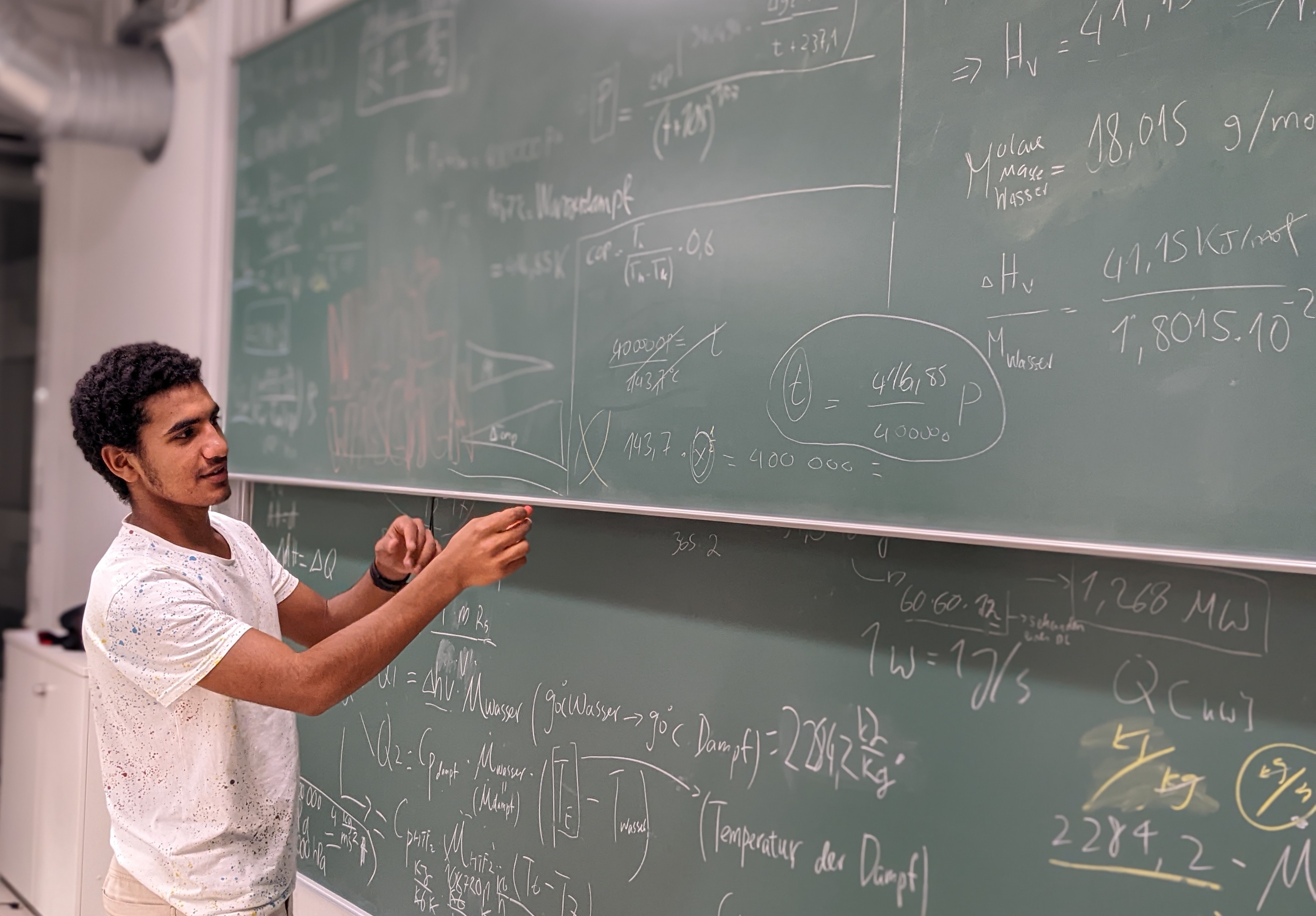IAMIT Workshop 2023
The workshop will take place on March 21 – 24, 2023, in Karlsruhe, Germany.
Idea
The idea of the workshop is to bring together techniques and experiences from the teaching and learning in the field of applied mathematics. A particular focus will be on the implementation of mathematical modeling in schools and at university level. Especially, advanced mathematics and long-term projects will be discussed. Due to the application-oriented focus of this workshop, interdisciplinary STEM projects will also be highlighted.

In particular, we plan to discuss the following seven topics:
- Implementation of mathematical modeling in high-schools
- Practical elements in active learning environments
- Product orientation in modeling tasks
- Taxonomy in project based learning
- Interdisciplinary education
- Mathematical Modeling in digital environments
- Mathematics education in the era of AI and Data Science
The topics are chosen broad in order to allow many possible connections between the different participants. One goal of the workshop is to explore topics for international collaboration and joint research projects in advanced applied mathematics.
Program
Various presentations on the above seven topics are planned during the workshop.
The detailed program follows.
| Time | Tuesday, 21.03 |
Wednesday, 22.03. |
Thursday, 23.03. |
Friday, 24.03. |
|---|---|---|---|---|
| 09:00 – 10:00 | Plenary talk (Rolf Biehler) |
Plenary talk (Avenilde Romo) |
Plenary talk (Jonas Ärlebäck) |
|
| 10:15 – 12:15 | Minisymposium 2 | Minisymposium 3 | Minisymposium 4 | |
| 12:15 – 14:00 | Registration (R. 0.014) |
Lunch break | Lunch break | Lunch break |
| 14:00 – 15:00 | Welcoming + Plenary talk (Martin Bracke) |
Plenary talk (Irene Ferrando) |
Plenary talk (Martin Bracke, Luis Siero, Sarah Schönbrodt) |
Open Work Session |
| 15:30 – 17:30 | Plenary talk (Jürgen Maaß) Minisymposium 1 |
Activities in Karlsruhe | insight in CAMMP (Stephanie Hofmann, 20 min.) World Café + Open Work Session |
Discussion on future cooperations + Farewell |
| 18:30 | Dinner Kleiner Ketterer |
Dinner Oxford Pub |
Various lunch options can be found here.
Plenary talks
- Martin Bracke (Kaiserslautern, Germany)
Good education for working in interdisciplinary STEM projects: Experiences and wishes - Irene Ferrando Palomares (Valencia, Spain)
IMMC-Spain: Introducing the modelling challenge in Spain - Rolf Biehler (Paderborn, Germany)
Challenges for Mathematics Education in AI and Data Science era - Jonas Bergman Ärlebäck (Linköping, Sweden)
A brief overview of 20 years of methodological and theoretical developments in the research on Fermi problems in the context of teaching and learning mathematical modelling - Avenilde Romo Vázquez (Mexico City, Mexico)
Mathematical modelling activities from engineering to school - Martin Bracke, Luis Siero, Sarah Schönbrodt
Implementation of interdisciplinary STEM projects in school and university with suggestions for changes in the educational system - Jürgen Maaß (Linz, Austria)
Detecting Fake News and Learning More About Reality – a Very Important Part of Mathematics Education
Minisymposium 2
10:15 – 10:35
Talk 1: Decision trees with data cards in Grade 6 - Insights into the tool and the teaching module – Susanne Podworny (Paderborn, Germany)
10:35 – 10:55
Talk 2: Artificial Intelligence and Machine Learning with Decision Trees realised with the digital tools CODAP and Jupyter Notebook for Mathematics and Computer Science Teaching – Yannik Fleischer (Paderborn, Germany)
10:55 – 11:15
Talk 3: How much mathematical modeling is in AI? – Martin Frank (Karlsruhe, Germany)
11:15 – 11:35
Talk 4: AI education as a starting point for interdisciplinary STEM projects? – Sarah Schönbrodt (Karlsruhe, Germany)
11:35 – 12:15
Discussion
Minisymposium 3
10:15 – 10:35
Talk 1: Patterns of interplay between the tool use and the learning outcome in projects about modelling with differential equations – Mette Andresen (Bergen, Norway)
10:35 – 10:55
Talk 2: Integration of STEM disciplines in an interdisciplinary course for first-year engineer-ing students – Genaro Zavala, Angeles Dominguez (Monterrey, Mexico)
10:55 – 11:15
Talk 3: What role can differential equations play in upper secondary mathematics education? Modelling and qualitative analysis – Sebastian Bauer (Göttingen, Germany)
11:15 – 11:35
Talk 4: Epidemiological modeling: A simple approach – Miguel Alejandro Díaz Hernández (Tijuana, Mexico)
11:35 – 12:15
Discussion
Minisymposium 4
10:15 – 10:35
Talk 1: Combining analysis tools to characterize mathematical model development in statistical tasks – Lluís Albarracín (Barcelona, Spain)
10:35 – 10:55
Talk 2: Agent based modelling in mathematics education – Nataša Grgurina, Jos Tolboom (Groningen / SLO, Netherlands)
10:55 – 11:15
Talk 3: Computational Thinking in Secondary Mathematics Education using GeoGebra: Results from a Design Study – Christos Chytas (Netherlands)
11:15 – 11:35
Talk 4: The effect of programming on mathematics education – Lukas Bayer (Kaiserslautern, Germany)
11:35 – 12:15
Discussion
Abstracts
The abstracts of all talks can be downloaded here.
Venue
The workshop will take place at:
Karlsruhe Institute of Technology, Englerstraße 2, 76131 Karlsruhe
Room 0.014, Building 20.30 (see Google Maps)
Organisation
Sarah Schönbrodt, Martin Bracke, Martin Frank, Luis Ramón Siero González

